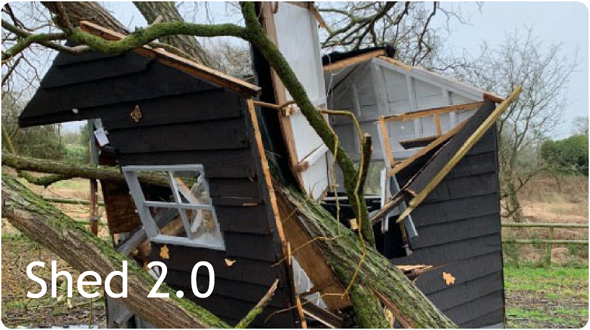Twelve hours after finishing Shed 1.0 (Capex £30), Storm Dennis killed it on the 15th February. Shock, denial, anger etc, onto Gumtree and two days later, replacement purchased. Shed 2.0 involved a little more Capex (£75) and a lot more Opex (manual labour), but above all else a better outcome..

Dennis and its “Shed” impact, whilst not a black swan event, was a clear reminder of the need for understanding risks (willow tree brittleness) and the impact of scope creep (soil movement); much like what’s been happening around us these last 6 weeks re the oil price wars and the Coronavirus.
A few weeks later, on the 5th March I gave a talk at the APPEX conference in London around the Future of Exploration in Africa. On slide 4, it suggests that we are (were) in a “perfect storm (ESG, Transition, sub $60 WTI and sub $2HH)..an existential schism that Industry and Resource holders need to address and overcome expediently to survive.” I was proved wrong very quickly. As we all know, getting involved in the business of prediction is a quick way to look like an idiot.
Post the 8th March, we are in sub $30 WTI- a “perfect cyclone”, with ESG and planning for a carbon free future falling massively down the pecking order, overtaken by focus on keeping the Corporate lights on (balance sheets and liquidity options, lowering Capex and forthcoming layoffs; rather than unsustainable debt fueled/dividend/buyback quantitative easing).
I suspect many of you, like me, are still in a mental “twilight zone” on recent events, particularly for what it means collectively and individually in the mid and long term.
In E&P, we have worked with huge reams of data and decision ambiguity most of our careers. Whilst Risk is measurable uncertainty; uncertainty is unmeasurable risk. We are most certainly in the latter landscape in the near-mid term, unless we see a Russian rabbit and/or a Corona black swan solution.
Those of us that have been around a while will know we are not likely at a point of schism; more a case of being at a critical crossroads. As Yogi Berra said: “when you see a fork in the road take it”.
Unfortunately, at this point of our pandemic/commodity cycle, we do not have the ability to fully determine whether the forward path be V, U (how fast and high the bounce is tbc.) or L (lower for longer..again) shaped. A number of brokers are looking at $30-40-60 for WTI for 2020-21-22, so it may be some time..
There are undoubtedly a vast array of variables and paradigms to be overcome for the Industry; but where to start? To name a few:
Industry stakeholders are not as globalized/connected in their behaviours and perspectives as they need to be. Analogous in some respects to how different Countries are addressing their responses to the Coronavirus pandemic
E&P decision makers are not aligned due balance sheet stresses, egos, fighting for relevance, corporate cultural mindsets, strategic and tactical perspectives etc.
CAPEX Already some $100Bn of planned expenditures has been shelved in 2020 (Rystad), tip of the iceberg and of course with impact on future production declines / supply
Capital markets other than the debt holders don’t care too much. Investors will remain wary until there is more clarity on the likely scale of both potential losses and write-downs in the system
Contrarian Investors may call the “bottom” in Q2 2020 and pick up some Corporate/asset bargains.
Bid-ask spreads for M&A ..price volatility will scupper asset deal flow. That should not however rule out Corporate consolidations, especially in the US.
US UCRs not shutting down production (to control the barrels) fast enough, there should be no capital inflow to Shale at <$25 and $1.6/mcf. Texas regulators are being asked to intervene to cut production, the last time was 1973, unlikely to happen. $86 Bn of debt to paid in the next 4 years.
Resource holders particularly in the developing world will be unable to react swiftly enough on fiscal flexibility to avoid potential investment/revenue meltdowns with direct impact on Education and Health budgets a massive issue down the road.
Oil price wars: Russian socio-political resolve may well trump (sic) the KSA’s (aka the Global Industry’s Central bank until recently) on the oil price front. Russia's economy is more diversified, has a lower breakeven budget and no debt, with significant sovereign reserves built up over the last 5 years through dealing with sanctions.
With oil prices at current levels, vulnerable producer countries may see oil income plunge by up to 85 per cent,” the International Energy Agency’s Fatih Birol said on the 23rd March. Ironically what is a threat to the US, is providing something of a windfall to China the World’s biggest Oil importer
Demand- Some 10-25% of global consumption could vanish in Q2 2020 which in some ways overshadows the price wars, at least in the near term..
NOCs will likely stay on the sidelines and try and soldier through the "cycle" given their political and lower cost of capital drivers, the majority will continue to produce sub $20 oil and be slow to adapt to the new normal. This may eventually hurt them, in terms of being majority global resource holders they need to be wary of their assets ultimately being stranded through the transition.
More than a million jobs in just the oilfield service industry are likely to be cut in 2020 due to low project volumes brought upon by the Covid-19 epidemic and the ongoing oil price war, with shale services will bear most of the reductions. Low oil prices are likely to persist into 2021 with improvement only really seen in the latter half of 2021 w/ focus on near cycle projects (Rystad)
Small Co’s and debt-ridden mid Co’s may start to wither on the vine and go bust, this was starting to happen with Capital markets locking up, but may now be accelerated
Public market driven lowest cost of capital assets will survive as they should.
Politicians and Consumers have bigger issues on their plate right now
CoVid-19 When it has run its course, may entail a full-scale rethink about the benefits of Globalization, leading to more Nationalist/"Tribal" geo-politics and reduced Oil demand at least in the developed world
The world is running out of Oil storage options (currently c.75% full) to leverage a price contango and lengthen the price rut. Analysts at Rystad Energy estimate that the world has about 7.2bn barrels of crude and products in storage, including c.1.4bn barrels onboard oil tankers at sea. In theory, it would take nine months to fill the world’s remaining oil stores, but constraints at many facilities will shorten this window to only a few months
..and that’s before you get to ESG, Transition, lack of capex into declining mature assets over the last 5 years and host of our challenges etc. etc.
Ok who wants to be an idiot? It’s hard to predict what’s next, period. What is however key is "relevance"; as we get older in life there is an innate need to remain "relevant" and "make a difference".
The E&P Sector is and should be "relevant" for another 20 years plus, but still has to continue to earn it's right to deliver and "make a difference" through the transition and that means a systemic change that goes beyond greenwashing, oil price wars and everything else thrown at us.
Our Industry shed has again been broken by recent events. E&P 2.0 or 23.6 (whichever lens you look at it from) needs a(nother) complete rebuild and narrative to make the difference and accelerate into the Energy transition.
Macro-economics and black swan events of late are clearly seminal catalysts. How it will happen is difficult to predict, accept to say it will not be linear and we will all predict wrongly. But we will do it, history says nothing less, because we have to.
Rosneft Chief Executive Igor Sechin was unwilling to give ground as the U.S. shale industry faces collapse. Oil prices could go back to $60 a barrel if “shale oil leaves markets,” he said on 20th March. On 23rd March his rival, Lukoil co-owner Leonid Fedun, said “this will be a war until exhaustion.” There you have it.
From my perspective, the UAE and Oman as regional mediators, may need to convince Russia and the KSA to get back to the OPEC+ table in Q3, along with sweeteners (sanctions and arms [F-35] sales respectively?) to both parties from the US, as a solution scenario that could help shorten the oil price war. The next OPEC+ meeting in June will be key. Covid19 will hopefully be mainly overcome by Q4 2020 and with a mini economic rebound, we will be back in high $40’s by YE.. beyond brinksmanship and back on the road to transition redemption and a bit more relevance.
Oh, what I would give to be an oil tank farm owner right now, but reality dictates that I might instead have to hunker down in the shed (2.0) for a while until the uncertainty dies down. As General Patton said: “A good plan, violently executed now, is better than a perfect plan next week.”

Eskil Jersing, EP Executive
See also: BUILDING A BRIDGE..A PERSONAL PERSPECTIVE
If you have news or commentary you would like to share, please contact us and we will be in touch.
 KEYFACT Energy
KEYFACT Energy